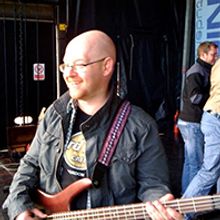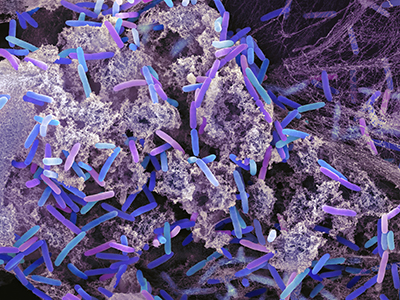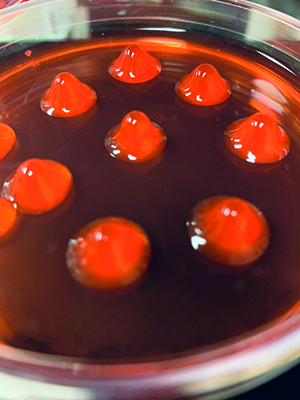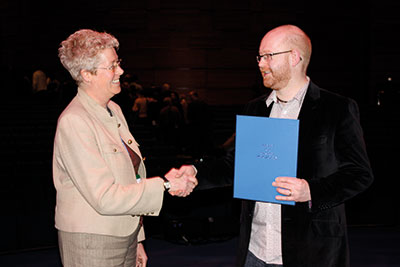An interview with Fleming Prize Winner Professor Stephen Diggle
Issue: Fleming Prize Winners
20 October 2020 article

Professor Stephen (Steve) Diggle graduated in Biological Sciences (BSc, University of Salford, 1997, 1st Class) prior to undertaking a PhD in molecular microbiology studying quorum sensing in Pseudomonas aeruginosa (University of Nottingham, 2001). He worked as a Postdoctoral Fellow at Nottingham, on both EU and BBSRC funded grants, before obtaining a Royal Society University Fellowship (2006–2014). He was promoted to Associate Professor in 2013, and in April 2017, he moved to the School of Biological Sciences at Georgia Institute of Technology (Georgia Tech) in the US. He currently serves on the Editorial Board of Microbiology, and has previously served on the Editorial Boards of FEMS Microbiology Letters, BMC Microbiology, MicrobiologyOpen and Royal Society Open Science. Steve was an Elected Member of the Microbiology Society Council (2012–2016) and has also served on the Scientific Conferences and Policy Committees.

His research is primarily focused on cooperation and communication in microbes and how these are related to virulence, biofilms and antimicrobial resistance. He has had a long-standing interest in understanding how the opportunistic pathogen Pseudomonas aeruginosa causes disease and is especially interested in how this organism evolves during chronic infections – such as those found in cystic fibrosis lungs and chronic wounds.
In his spare time, he plays bass guitar, has played in a number of covers bands and recorded some original music in a band called Meaner. For this interview, Steve spoke to Madeline Mei, a PhD student from his research group, about winning the Fleming Prize in 2010 and his research career.
Could you provide a brief description of your research and the research you were awarded the Fleming Prize for?
I received the Fleming Prize because, in collaboration with evolutionary biologists, we were one of the first groups to look at quorum sensing from an evolutionary perspective; not just focusing on how it functions at a molecular level, but asking about the fitness benefits it provides in environments. I became interested in explaining how quorum sensing is maintained in natural populations, given that we showed it is exploitable by anti-social cheats. Our group therefore made connections between mechanism and evolutionary ecology, and we had great multi-disciplinary collaborations.
What did it mean to you to be awarded the Fleming Prize?
It was a real honour for me personally, and it feels great to be recognised by the Society and your peers for doing novel and interesting work.
Why does microbiology matter?
Microbes are crucial within every ecosystem and they influence many aspects of our daily lives. Notably, microbes remain a major infection problem and play significant roles in influencing disease outcomes. Antimicrobial resistance is one of the most significant global problems that we face today. Microbiome research is changing the way that we think about certain diseases and human behaviours. CRISPR-Cas, discovered by microbiology researchers, has the potential to change the world. Who knows what new discoveries and technologies will come from microbiological studies in the future? It remains an incredibly exciting field to be involved in and it continues to attract world-leading researchers.

What do you feel is important for early career researchers to consider?
Finding your niche in academia. There are a number of challenges; how do we carve out a career in academia? How do we find our niche? A huge hurdle to getting a Principal Investigator (PI) position is developing an idea that is your own, distinct enough from your previous PI’s research, and competitive enough to get funding. You should be open to ‘thinking outside the box’ and consider collaborating with researchers from other disciplines because they contribute new ways of thinking about microbes.
Publishing papers. Publishing your work is very important for furthering your career. There still appears to be an obsession in publishing in high impact journals (which has been termed ‘impactitis’), but it is important that this does not become the main driving force, because this can significantly delay publishing your findings. It may benefit your PI, but it may not always benefit you. There is a balance to be struck here and, ideally, you should be able to discuss this with your PI to allow you to publish findings in a timely manner.
Address diversity and inclusion. I would encourage young researchers to become involved in promoting minority and under-represented groups in science. The UK has taken a lead in this respect with the Athena Swan Program, which recognises good practices in higher education and research institutions towards the advancement of gender equality. Becoming involved in programs like this promotes diversity in our field, which greatly benefits us all.
Socialise with others in your field. Make sure you attend conferences. Present your work, communicate with your peers and PIs, and take advantage of all the networking opportunities available. Most importantly, be enthusiastic about your work.
Read, read, read! Stay on top of the literature in your field. This can be hard, as the amount of papers published can be overwhelming. Reading the work of others really is one of the most important things you can do in science and it leads to new ideas. A good grasp of the literature also maximises your chances of publishing papers that are conceptually and experimentally novel, because you are less likely to be working on a project that is ‘reinventing the wheel’.
Plan for papers. Think ahead about ideas to work on for a paper. It keeps you focused, organised and on task, so that you are able to conduct relevant experiments and publish papers more efficiently.
What is the potential impact of your research in five years?
Our lab is interested in bacterial interactions and how ecology and evolution shape behaviours and influence infections in ways that we do not yet understand. Determining why bacteria have these behaviours and how they contribute to infection will hopefully lead to the development of novel treatments and improve the outcome for patients.

What have been some challenges in your career and how did you approach them?
The biggest challenge for me was the transition from postdoc to PI. Developing a unique research niche and selling this (and yourself) to employers or fellowship funders is challenging. For me, I overcame this a bit by chance. I attended a talk by an evolutionary biologist who worked on ants. He discussed cooperative behaviours and how we should not assume that bacteria cooperate by quorum sensing for the benefit of the population. It made me realise that few people had delved into evaluating microbial behaviours from an evolutionary perspective. This allowed me to work with evolutionary biologists to develop my own ideas that were distinct from the work I performed as a postdoc.
I also feel that it is difficult to get funding for multidisciplinary work. Funding bodies often state they want to see multidisciplinary projects, but they can be hard for reviewers to assess because they are often specialised in one discipline. It is easy to ‘fall between the cracks’ because you are doing something different. Don’t give up!
Moving to another country is not easy. The funding systems, teaching methods and the environment are all very different. There may also be family issues when moving abroad. I moved to the USA in 2017. It has been challenging, but also exciting and I enjoy it. With hindsight, I probably would have greatly benefitted from moving earlier in my career. I recommend a spell in a different country if you get the opportunity to do it.
Interviewer: Madeline Mei
PhD Student, Georgia Institute of Technology, USA
